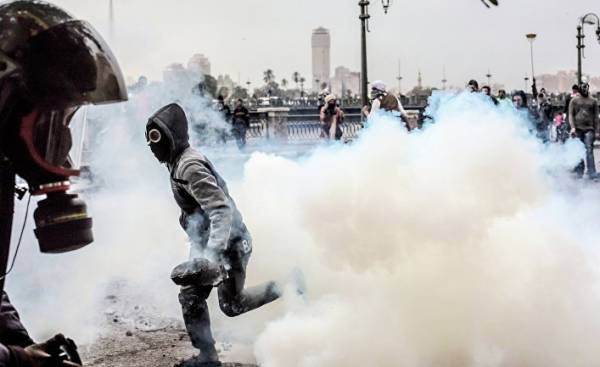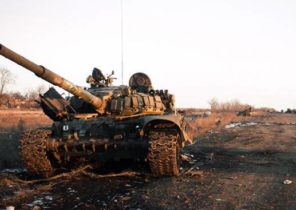
Beirut — you Can find many striking Parallels between the outbreak in 2010, the “Arab spring” and the events of the past year: a referendum on Breccia in the UK, the election of the President of the United States Donald trump, the revival of right-wing forces in Europe. In each of these cases, the old order fell, and the progressive party was too weak to resist the emergence of authoritarian and xenophobic forms of government.
The basis of the Arab uprisings in 2010-2011 were lying the growing dissatisfaction with the status quo, and this discontent had many causes, the opposition could take both progressive and conservative forms. The middle class was dissatisfied with the loss of dignity under the control of an unaccountable elite. Young people didn’t like the future that looked particularly grim in comparison with the expectations of the parent generation. Meanwhile, the Islamists have raised moral opposition against the loss of society’s ethical values.
All these are familiar topics of debate that are now in Western countries: here are a growing number of disaffected whites, but also lost their usual work of the workers and disenchanted youth. As economic liberalism was gradually displaced the old principles of equality and social solidarity, began to have huge gaps in wealth that is negative, corruptive influence on politics in many Western countries.
Meanwhile, globalization and technological innovation has had a deeply negative impact on certain segments of society, the government has failed to soften the blow. Now urgently required large-scale political correction that is not in the least due to the deadly threat posed to the planet by climate change.
But what will this correction and who will do it? Popular outrage in the streets and at the polls — have not yet led to the emergence of alternative models of governance that would provide quality solutions to the political, social and economic problems that engulfed the society of the countries of the West and the Middle East.
In the Arab world the explosion of popular indignation was the overthrow of old regimes. However, the former authoritarian rulers persistently worked to destroy any rudiments of serious opposition. In the end, the revolutions of 2010-2011, there were no leaders who could fill the current political vacuum. Instead, on the first plan quickly came out of the army, tribes, sectarian groups and religious parties.
Egypt has witnessed a restoration of authoritarian rule. Yemen, Syria and Libya engulfed in civil war. Lebanon and Iraq are fragmented. Countries that produce oil, trying to extinguish the regional fire, beat him with money, is now faced with a significant budget deficit. Turkey also switched to the mode of government a strong hand; the progressive forces of Iran are weakened. Only Tunisia has occupied a difficult process of transition to democracy; however, even in this country, economic reforms could not solve the challenges facing it.
The new authoritarian rulers of Middle Eastern countries are consolidating power, using the tactics of “divide and conquer”, they provoke polarization of citizens along the line of religious or other identities. Against the background of growing sense of loss of personal security, many citizens are beginning to give preference not to the society but religious sectarianism, not civil rights, and security assurances.
In Western countries, populist politicians, not having realistic plans for the construction of a better future, today copy the authoritarian rulers of the Middle East. They win elections, fueling fears of the “other” (refugees, Muslims, foreign terrorists), and promising to seek security through force. Once in power, they just begin to consolidate power. Democratic institutions can be resistant to the reign of the populists; but, as we have seen in the US, these institutions will face a serious challenge, and they will surely be weakened, and even before the test ends.
Parallels are observed in the sphere of international politics. Geopolitical map of the Middle East is beginning to change under the influence of transnational split between Shiites and Sunnis (fuelled by the rivalry between Iran and Saudi Arabia), as well as external intervention in regional conflicts. Western leaders-populists likewise, act against the interests of their countries against China, Russia, India, countries of Northern Europe, they challenge the international order, existing since 1945, without offering anything that even remotely resembled a real alternative.
And we see the failure of the progressive political forces to provide such an alternative. Throughout the world there is a shift of the dominant rhetoric. Many people no longer believe in the future, generated by progress, dynamic economy, global integration, social democracy. Increase more pessimistic view that the future is tainted by globalization, out of control markets, global warming, and technological innovations that destroy jobs.
Restoring optimism in the middle East and in the West, will depend on whether intellectuals, trade unions, progressive parties and civil society groups to create a unified political base and to offer a shared vision of the future. This requires not just innovative solutions to problems, but also a credible means to implement changes in a democratic way.
At least this new era of resistance and revolution brought us back to the problems that previously hard to ignore the accumulating in the shadows. Now we know that the economic policy must be sharpened to the inclusion; that the material consumption should be restricted; that democracy must be protected from the corrupting influence of concentrations of wealth and vested interests.
This, of course, a huge challenge; but if we can clearly define the problems, we can begin to act. Success in one place will be a model for all others. Next time, when millions of people held a peaceful March in Cairo, demanding that their voice was heard, the reason for this could be the self-immolation in Sidi-Bouzid and rebellion in Istanbul, the impeachment of the President of the United States, the victory of progressive parties in elections in Europe.







